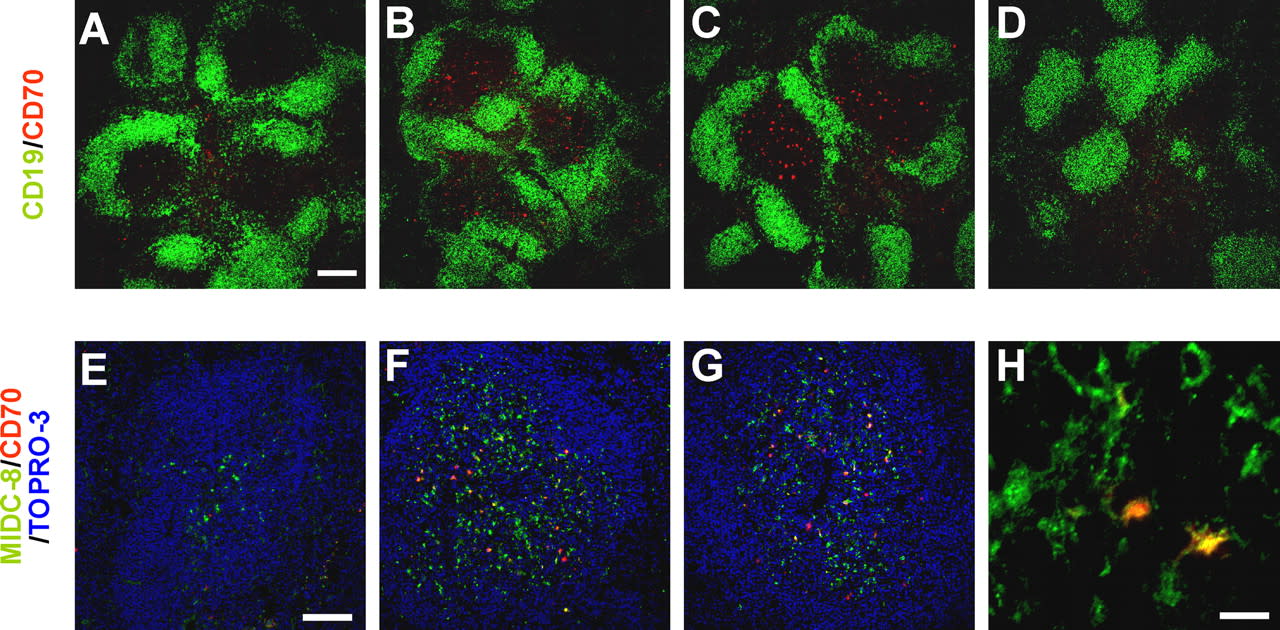Cat. #151721
Anti-CD70 [TAN 1-7] mAb
Cat. #: 151721
Sub-type: Primary antibody
Unit size: 100 ug
Availability: 3-4 weeks
Target: CD70
Class: Monoclonal
Application: ELISA ; FACS ; IF ; Fn
Reactivity: Mouse
Host: Rat
£300.00
This fee is applicable only for non-profit organisations. If you are a for-profit organisation or a researcher working on commercially-sponsored academic research, you will need to contact our licensing team for a commercial use license.
Contributor
Institute: University of Southampton
Tool Details
*FOR RESEARCH USE ONLY (for other uses, please contact the licensing team)
- Name: Anti-CD70 [TAN 1-7] mAb
- Alternate name: CD7 Molecule; Tumor Necrosis Factor Ligand Superfamily Member 7; CD27 Ligand; CD27LG; TNFSF7; CD27L; Tumor Necrosis Factor Ligand 8A; Surface Antigen CD7; Ki-24 Antigen; CD7 Antigen; TNLG8A
- Research fields: Apoptosis and autophagy;Cancer;Immunology;Stem cell biology
- Clone: TAN 1-7
- Tool sub type: Primary antibody
- Class: Monoclonal
- Conjugation: Unconjugated
- Reactivity: Mouse
- Host: Rat
- Application: ELISA ; FACS ; IF ; Fn
- Description: Monoclonal antibody directed against CD70 cytokine, capable of blocking the CD70-CD27 interaction involved in B and T cell activation.
- Immunogen: Recombinant mouse CD70 (extracellular domain, aa residues 41-195)
- Immunogen uniprot id: O55237
- Isotype: IgG2a
- Myeloma used: NS0
- Recommended controls: Activated dendritic cells
Target Details
- Target: CD70
- Tissue cell line specificity: Activated dendritic cells
- Target background: CD70 is a cytokine that belongs to the tumour necrosis factor (TNF) ligand family. This cytokine is a ligand for TNFRSF27/CD27. It is a surface antigen on activated, but not on resting, T and B lymphocytes and dendritic cells. It induces proliferation of co-stimulated T cells, enhances the generation of cytolytic T cells, and contributes to T cell activation. This cytokine is also reported to play a role in regulating B cell activation, cytotoxic function of natural killer cells, and immunoglobulin synthesis. CD70 expression is induced upon activation of DCs, indicating that the CD70-CD27 interaction could take place during the activation of naive T cells by DCs. Anti-CD70 is non-depleting and blocks the CD70-CD27 interaction. CD70 expression is thought to play a role in autoimmune disease regulation, and treatment of autoimmune diseases such as rheumatoid arthritis.
Applications
- Application: ELISA ; FACS ; IF ; Fn
Handling
- Format: Liquid
- Concentration: 1 mg/ml
- Unit size: 100 ug
- Storage buffer: PBS with 0.02% azide
- Storage conditions: Store at -20° C frozen. Avoid repeated freeze / thaw cycles
- Shipping conditions: Dry ice
References
- Arora et al. 2014. Immunity. 40(1):105-16. PMID: 24412610.
- A single subset of dendritic cells controls the cytokine bias of natural killer T cell responses to diverse glycolipid antigens.
- Invariant NKT cells promote CD8+ cytotoxic T cell responses by inducing CD70 expression on dendritic cells.
- Taraban et al. 2008. J Immunol. 180(7):4615-20. PMID: 18354184.
- Rowley et al. 2004. J Immunol. 172(10):6039-46. PMID: 15128787.
- Stimulation by soluble CD70 promotes strong primary and secondary CD8+ cytotoxic T cell responses in vivo.






